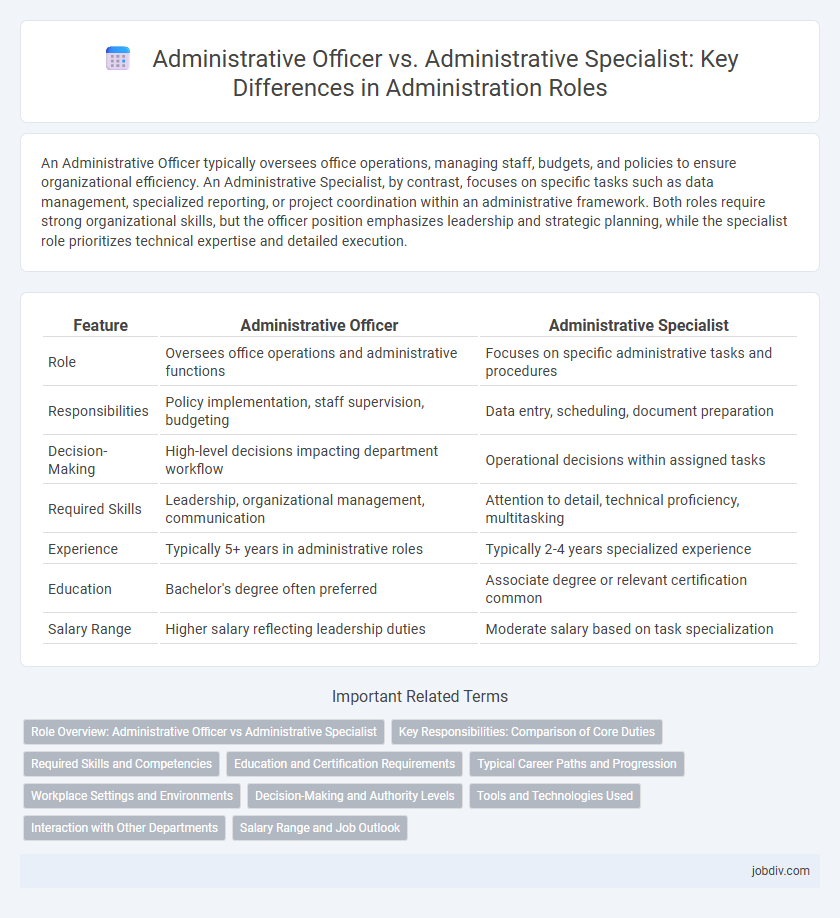An Administrative Officer typically oversees office operations, managing staff, budgets, and policies to ensure organizational efficiency. An Administrative Specialist, by contrast, focuses on specific tasks such as data management, specialized reporting, or project coordination within an administrative framework. Both roles require strong organizational skills, but the officer position emphasizes leadership and strategic planning, while the specialist role prioritizes technical expertise and detailed execution.
Table of Comparison
| Feature | Administrative Officer | Administrative Specialist |
|---|---|---|
| Role | Oversees office operations and administrative functions | Focuses on specific administrative tasks and procedures |
| Responsibilities | Policy implementation, staff supervision, budgeting | Data entry, scheduling, document preparation |
| Decision-Making | High-level decisions impacting department workflow | Operational decisions within assigned tasks |
| Required Skills | Leadership, organizational management, communication | Attention to detail, technical proficiency, multitasking |
| Experience | Typically 5+ years in administrative roles | Typically 2-4 years specialized experience |
| Education | Bachelor's degree often preferred | Associate degree or relevant certification common |
| Salary Range | Higher salary reflecting leadership duties | Moderate salary based on task specialization |
Role Overview: Administrative Officer vs Administrative Specialist
Administrative Officers oversee organizational operations, manage office resources, and enforce company policies to ensure efficient workflow and compliance. Administrative Specialists focus on specific administrative functions such as data management, document preparation, and coordinating communication within departments. Both roles support organizational effectiveness but differ in scope, with Officers handling broader management tasks and Specialists concentrating on specialized administrative duties.
Key Responsibilities: Comparison of Core Duties
Administrative Officers oversee organizational operations, manage office resources, and ensure compliance with policies, focusing on strategic planning and coordination. Administrative Specialists handle specialized tasks such as data management, reporting, and technical support, emphasizing precision and expertise in specific administrative functions. Both roles contribute to efficiency but differ in scope, with officers maintaining broad oversight and specialists providing focused administrative support.
Required Skills and Competencies
Administrative Officers require strong leadership capabilities, proficiency in budgeting, and expertise in policy implementation to oversee organizational operations effectively. Administrative Specialists excel in detailed record-keeping, data analysis, and advanced software skills to support administrative tasks efficiently. Both roles demand excellent communication, problem-solving abilities, and organizational skills to ensure smooth office function.
Education and Certification Requirements
Administrative Officers typically require a bachelor's degree in business administration, public administration, or a related field, often combined with management experience. Administrative Specialists usually hold an associate degree or certification in office administration, with proficiency in specialized software and clerical skills prioritized. Certification options such as the Certified Administrative Professional (CAP) enhance qualifications for both roles, particularly within government and corporate settings.
Typical Career Paths and Progression
Administrative Officers typically progress through roles such as Office Manager, Department Coordinator, and eventually Senior Administrative Manager, emphasizing leadership and strategic planning responsibilities. Administrative Specialists often follow a path that includes roles like Executive Assistant, Project Coordinator, and Operations Analyst, focusing on specialized skills and technical expertise within administrative functions. Career advancement for Administrative Officers frequently involves broader managerial duties, while Administrative Specialists tend to deepen their expertise in niche areas of administration.
Workplace Settings and Environments
Administrative Officers typically operate in structured government or corporate offices where they oversee policy implementation and manage departmental functions. Administrative Specialists work in diverse environments ranging from healthcare facilities to educational institutions, providing specialized support tailored to specific operational needs. Both roles demand adaptability to dynamic workplace settings but differ in scope and the nature of administrative tasks performed.
Decision-Making and Authority Levels
Administrative Officers hold higher decision-making authority, often responsible for policy implementation and overseeing administrative operations across departments. Administrative Specialists focus on executing specific administrative tasks with limited decision-making power, operating under the guidance of higher-level officers. Authority levels for Administrative Officers include budget management and strategic planning, whereas Specialists primarily handle routine processes and data management.
Tools and Technologies Used
Administrative Officers typically utilize enterprise resource planning (ERP) systems, advanced project management software like Microsoft Project, and integrated communication platforms such as Microsoft Teams or Slack to streamline operations. Administrative Specialists often focus on specialized tools like customer relationship management (CRM) software, document management systems (DMS), and data entry applications including Microsoft Excel and Google Workspace for detailed record-keeping and reporting. Both roles leverage automation tools like robotic process automation (RPA) software to increase efficiency in administrative workflows.
Interaction with Other Departments
Administrative Officers coordinate cross-departmental initiatives, ensuring effective communication and resource allocation between teams to meet organizational goals. Administrative Specialists handle specialized tasks within specific departments, providing expert support and detailed knowledge that enhance operational efficiency. Their interactions with other departments are more focused, often involving targeted collaboration for project-specific outcomes rather than broad organizational management.
Salary Range and Job Outlook
Administrative Officers typically command a salary range between $50,000 and $75,000 annually, reflecting their broader management responsibilities compared to Administrative Specialists, whose salaries generally range from $40,000 to $60,000. The job outlook for Administrative Officers is projected to grow by 6% over the next decade, driven by demand for organizational leadership in various sectors. Administrative Specialists are expected to see a steadier growth rate around 4%, emphasizing specialized support roles within administrative functions.
Administrative Officer vs Administrative Specialist Infographic

 jobdiv.com
jobdiv.com